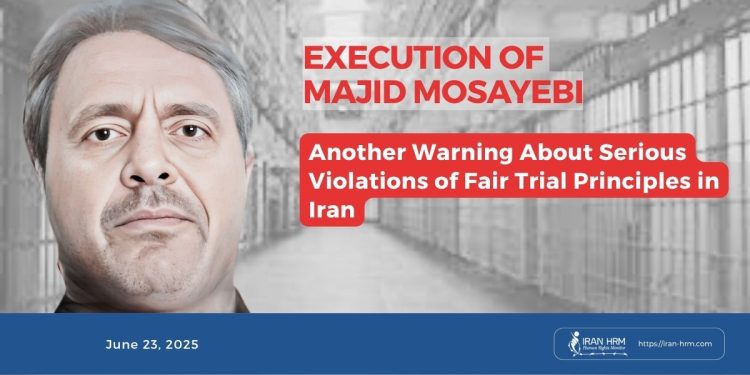On the morning of Sunday, June 22, 2025, the Judiciary of the Islamic Republic of Iran announced the execution of Majid Mosayebi, who had been accused of “espionage for Israel”—an event that once again raises alarm over the unjust legal proceedings and widespread human rights violations in Iran.
According to an official statement published by the Mizan News Agency, Majid Mosayebi had been accused of “sending classified information to the Israeli intelligence service” and “receiving financial rewards via cryptocurrency.” He was charged with moharebeh (enmity against God) and efsad-e fel-arz (corruption on earth), and was sentenced to death. Upon confirmation of this sentence by the Supreme Court, the execution was immediately carried out.
However, what has drawn increased attention from human rights organizations is not merely the nature of the charges, but the opaque judicial process, which lacked international fair trial standards.
A Closed Court Without a Chosen Lawyer
According to information from sources close to Mosayebi’s family, his trial was held behind closed doors without the presence of media. Moreover, the defense attorney was not selected by the family or the accused himself, but appointed by the judiciary—conditions that violate the principle of independent defense and the right to a chosen legal representative.
Transparency in legal proceedings is a fundamental pillar of justice. In many security-related cases, Iranian authorities claim “security considerations” to justify holding secret trials. However, international bodies view this approach as a serious risk to the right of defense, and a potential avenue for torture and coerced confessions.
Rising Security Charges Against Ordinary Citizens
The execution of Majid Mosayebi is just one example among many recent cases where individuals have been accused of espionage for foreign countries. In similar cases, many of the accused had no history of political or security activity and were targeted simply due to digital communications, international travel, or use of communication technologies.
Multiple reports by human rights organizations indicate that the definition of “espionage” under Iranian law lacks clarity and legal standards—an issue that enables the misuse of such charges against dissidents or defenseless individuals.
The Imminent Risk of Execution for Mohammad Amin Mahdavi Shayesteh
In the same context, human rights sources have expressed ongoing concern regarding the fate of Mohammad Amin Mahdavi Shayesteh, another defendant in a national security case. He was arrested in autumn 2023 and is currently held in solitary confinement. Reports indicate that he, too, has been denied a public trial and the right to choose his lawyer, and that his death sentence has been issued by the Revolutionary Court under Judge Abolqasem Salavati.
His family has released messages warning about the possible sudden execution of the sentence and have called for a retrial in an open court—a demand that reflects the legitimate call for adherence to the minimum standards of fair trial procedures.







